Daily Vocabulary Words: List of Daily Used Words
Hi there. Welcome to this special section @ Wordpandit.
Our endeavour here is straightforward: highlighting important daily vocabulary words, you would encounter in The Hindu. This is your repository of commonly used words; essentially, we are posting a list of daily used words. Hence, this has significant practical application as it teaches you words that are commonly used in a leading publication such as The Hindu.
Visit the website daily to learn words from The Hindu.
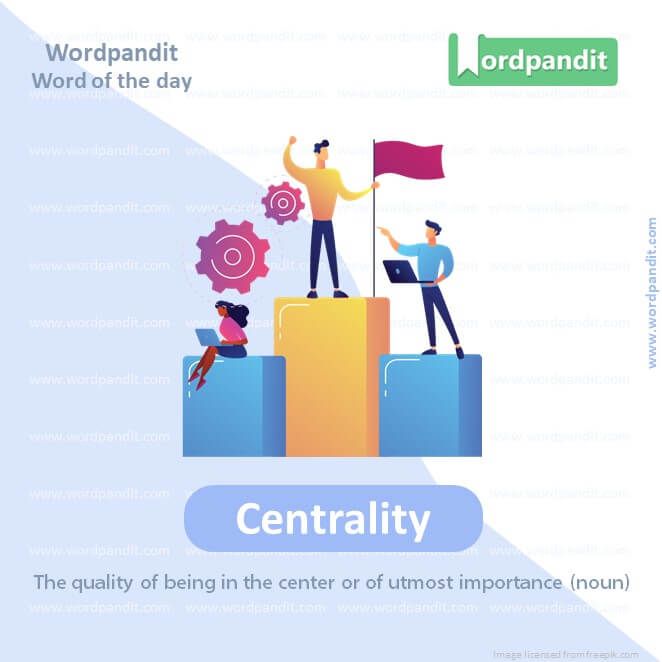
WORD-1: Centrality
CONTEXT: The peripherality of individual candidates of the BJP is also linked to the centrality of Mr. Modi in the election, which was clear at the conclave.
SOURCE: Not provided.
EXPLANATORY PARAGRAPH: Imagine you have a big box of crayons, and your favorite color is right in the middle, where everyone can see it because it’s the most important. Centrality is like being that favorite crayon, where something or someone is at the very center or most important part of everything else happening around.
MEANING: The quality of being in the center or of utmost importance (noun).
PRONUNCIATION: sen-TRAL-i-tee
SYNONYMS: Core, Heart, Middle, Focus, Essence, Nucleus, Hub
USAGE EXAMPLES:
1. The centrality of the sun in our solar system is why all the planets orbit around it.
2. In the story, the centrality of the hero’s journey made everything else seem connected.
3. The teacher explained the centrality of clean water in maintaining good health.
4. The centrality of the main idea in an essay helps keep the writing focused.
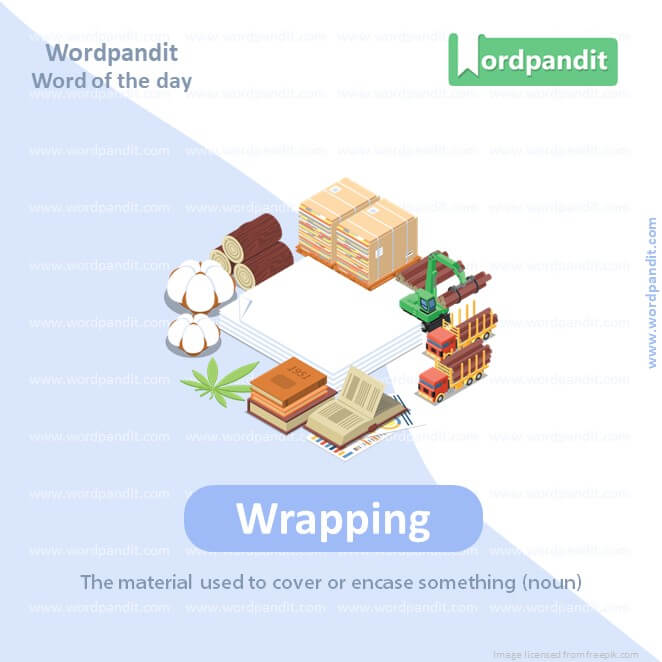
WORD-2: Wrapping
CONTEXT: The BJP manages to pull off this feat by wrapping its claims in strong communal identity terms.
SOURCE: Not provided.
EXPLANATORY PARAGRAPH: Think about when you get a present, and it’s covered in pretty paper that you have to tear open to see your gift. Wrapping is just like that paper! It’s what we use to cover or pack something to make it a surprise or protect it.
MEANING: The material used to cover or encase something (noun)
PRONUNCIATION: RAP-ing
SYNONYMS: Covering, Packaging, Paper, Envelope, Sheath, Cloak, Wrap
USAGE EXAMPLES:
1. Mom used shiny wrapping paper for the birthday gifts.
2. He finished wrapping the sandwich in foil before putting it in his bag.
3. The wrapping on the present was so beautiful, she didn’t want to tear it.
4. They used bubble wrap as wrapping for the fragile vase.
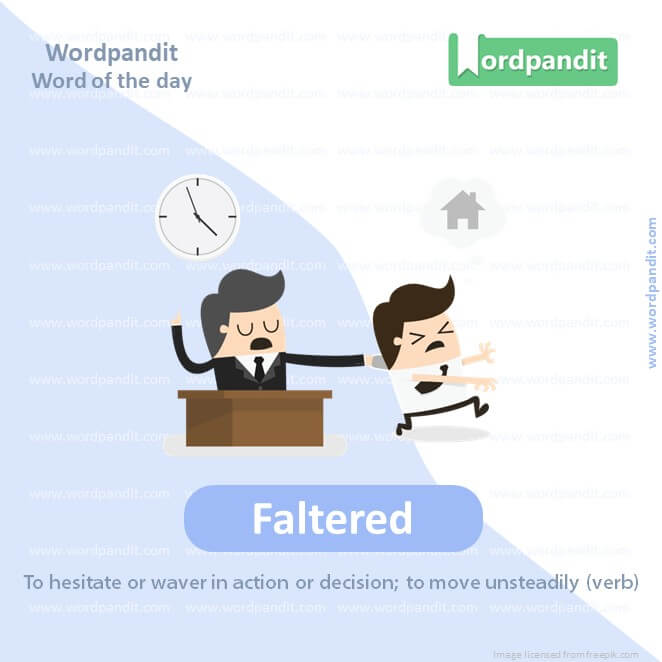
WORD-3: Faltered
CONTEXT: Engineering goods’ exports growth faltered to a little over 4% in January while the labour-intensive gems and jewellery slipped into a mild contraction, dropping 1.3%.
SOURCE: Not provided.
EXPLANATORY PARAGRAPH: Imagine you’re running or speaking smoothly, and suddenly you stumble or pause because you’re not sure or confident anymore. That’s faltering. It’s like when you’re walking on a wobbly path and have to slow down so you don’t fall.
MEANING: To hesitate or waver in action or decision; to move unsteadily (verb).
PRONUNCIATION: FAWL-terd
SYNONYMS: Stumbled, Hesitated, Wavered, Stuttered, Bumbled, Floundered, Teetered
USAGE EXAMPLES:
1. He faltered in his speech when he forgot his lines.
2. The horse faltered on the rocky path but regained its balance.
3. Her confidence faltered when she saw the size of the audience.
4. The team’s progress faltered due to unexpected challenges.
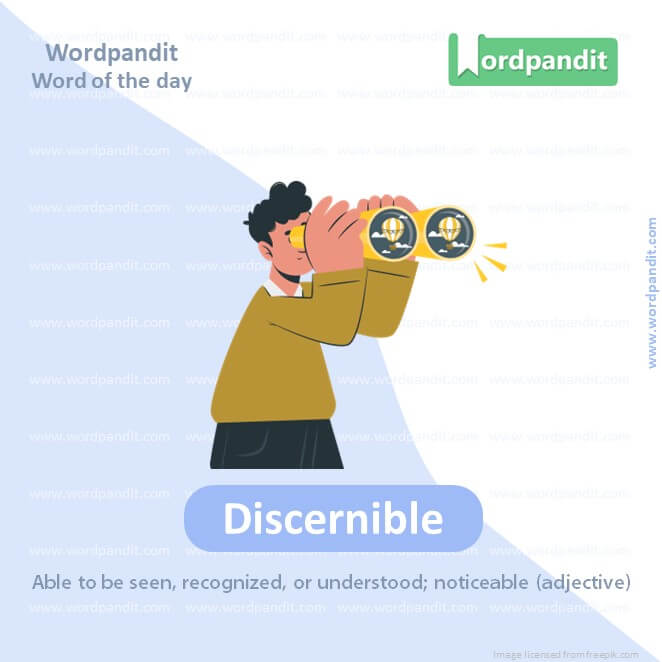
WORD-4: Discernible
CONTEXT: Apart from the lack of a broader discernible impact from the Red Sea shenanigans yet, the sharp decline in the goods trade deficit is notable as it hit a nine-month low of $17.5 billion — just three months after touching a record high of nearly $30 billion.
SOURCE: Not provided.
EXPLANATORY PARAGRAPH: Imagine you’re looking at a picture and you can clearly see all the different colors and shapes. Discernible means being able to notice or tell something apart because it’s clear and easy to see, like spotting your friend in a crowd because they’re wearing a bright hat.
MEANING: Able to be seen, recognized, or understood; noticeable (adjective).
PRONUNCIATION: dih-SERN-uh-buhl
SYNONYMS: Noticeable, Detectable, Observable, Perceptible, Visible, Apparent, Evident
USAGE EXAMPLES:
1. There was a discernible difference in quality between the two products.
2. His happiness was discernible by the smile on his face.
3. The improvements in the park were barely discernible.
4. The taste difference between the two dishes was quite discernible.
WORD-5: Exuded
CONTEXT: The government has exuded confidence that India will match its record export performance of $776 billion in 2022-23, this year as well, despite multiple global headwinds. On the goods front, though, attaining last year’s $451 billion tally looks difficult, especially with cooling commodity prices.
SOURCE: Not provided.
EXPLANATORY PARAGRAPH: Think of when you can feel someone is really happy or confident without them saying anything; it’s like they’re glowing with those feelings. Exuding is just like that! It’s when someone shows a feeling so strongly that it seems to spread out from them.
MEANING: To display an emotion or quality strongly and openly (verb).
PRONUNCIATION: ig-ZOOD
SYNONYMS: Radiated, Emanated, Displayed, Showed, Oozed, Projected, Emitted
USAGE EXAMPLES:
1. She exuded confidence during her presentation.
2. The room exuded a sense of calm and relaxation.
3. He exuded warmth and friendliness to everyone he met.
4. The garden exuded the sweet fragrance of roses.
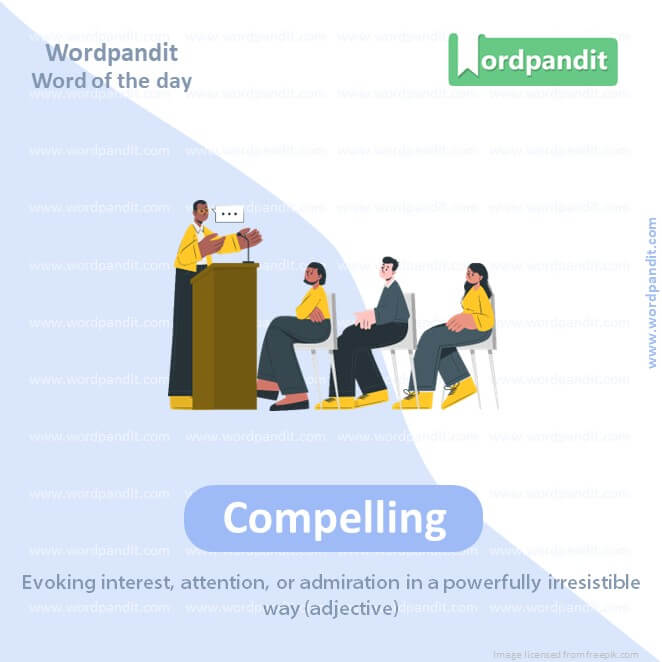
WORD-6: Compelling
CONTEXT: The political leadership in India and Greece is aware of the compelling strategic reasons and urgency to build a strategic relationship between the two countries.
SOURCE: Not provided.
EXPLANATORY PARAGRAPH: Imagine a story or a movie that’s so interesting and exciting that you can’t stop watching or listening to it. Compelling is when something grabs your attention and makes you want to know more because it’s so strong or fascinating.
MEANING: Evoking interest, attention, or admiration in a powerfully irresistible way (adjective).
PRONUNCIATION: kuhm-PEL-ing
SYNONYMS: Fascinating, Enticing, Persuasive, Captivating, Engaging, Irresistible, Convincing
USAGE EXAMPLES:
1. The book was so compelling that she read it in one day.
2. His argument was compelling, convincing everyone in the room.
3. The mystery was compelling, drawing them into the investigation.
4. She had a compelling reason for being late.
WORD-7: Unhurried
CONTEXT: Military and business cooperation has been moving along over the years, but at a slow and unhurried pace.
SOURCE: Not provided.
EXPLANATORY PARAGRAPH: Think about when you’re taking your time to eat your favorite snack, slowly and enjoying every bite, without rushing. Unhurried is just like that! It means doing something calmly and without rushing, taking your time to enjoy or finish what you’re doing.
MEANING: Not rushed; done at a relaxed pace (adjective).
PRONUNCIATION: un-HUR-eed
SYNONYMS: Leisurely, Relaxed, Slow, Easy, Calm, Measured, Deliberate
USAGE EXAMPLES:
1. They enjoyed an unhurried walk through the park.
2. He answered the questions in an unhurried manner.
3. The unhurried pace of life in the countryside was refreshing.
4. They had an unhurried breakfast together on Sunday.
WORD-8: Brokerage
CONTEXT: A mid-sized Indian shipping company has already opened a brokerage firm in Athens and looks to become a key player in the trans-Atlantic shipping market.
SOURCE: Not provided.
EXPLANATORY PARAGRAPH: Imagine a place where people help others buy and sell houses or shares in companies. Brokerage is like a special shop where these helpers, called brokers, work to make these buying and selling deals happen smoothly.
MEANING: The business or service of acting as a broker, especially in the buying or selling of stocks or real estate (noun).
PRONUNCIATION: BRO-kuh-rij
SYNONYMS: Agency, Firm, Business, Service, Office, Company, Establishment
USAGE EXAMPLES:
1. They decided to use a brokerage to help sell their house.
2. The brokerage charged a fee for each transaction.
3. He worked for a brokerage that specialized in luxury properties.
4. The investment brokerage offered advice on stock purchases.
WORD-9: Ratified
CONTEXT: Madras suffered a setback in March 1916 when it was informed by GoI that the award had been ratified.
SOURCE: Not provided.
EXPLANATORY PARAGRAPH: Imagine all your friends agreeing and giving a thumbs up to a rule for your clubhouse. Ratified means just that! It’s when everyone agrees to a decision or a rule and makes it official, like saying “Yes, we all agree this is what we’re going to do!”
MEANING: To officially approve or confirm by all necessary parties (verb).
PRONUNCIATION: RAT-i-fyd
SYNONYMS: Approved, Confirmed, Sanctioned, Endorsed, Validated, Authorized, Affirmed
USAGE EXAMPLES:
1. The treaty was ratified by all the countries involved.
2. The new policy was ratified at the meeting last night.
3. The amendment to the constitution was finally ratified.
4. The agreement was ratified by both parties without objection.
WORD-10: Stipulations
CONTEXT: The pact allowed a review of certain stipulations of the agreement after 50 years, which became the most controversial feature of the agreement.
SOURCE: Not provided.
EXPLANATORY PARAGRAPH: Imagine if you’re playing a game, and there are special rules you have to follow, like “you must hop on one foot” or “you can’t touch the ground.” Stipulations are like those rules or conditions that you agree to follow in a game, a deal, or any plan.
MEANING: Conditions or requirements that are specified or demanded as part of an agreement (noun).
PRONUNCIATION: stip-yuh-LAY-shuns
SYNONYMS: Conditions, Requirements, Provisions, Terms, Clauses, Specifications, Prerequisites
USAGE EXAMPLES:
1. The contract had several stipulations that needed to be met.
2. One of the stipulations for the job offer was relocating to another city.
3. The agreement included stipulations for regular maintenance.
4. The stipulations of the lease were clear and detailed.
Vocabulary Words
When delving into the dynamic world of languages, the grandeur of ‘vocabulary words’ is all-encompassing. The importance of ‘vocabulary words’ in effective communication cannot be overstated; it’s these words that form the backdrop of any language, painting intricate pictures of thoughts and ideas.
Starting on the journey of learning ‘vocabulary words’, one should steer clear from rote memorization. The traditional structure of merely repeating words lacks the necessary context and application that actually embeds these words into your memory. To truly master the ‘vocabulary words’, one needs an integrated, immersive approach.
The first step towards mastering ‘vocabulary words’ is to engage with varied language mediums. Expanding beyond textbooks to read fiction, articles, blogs, and other forms of content not only diversifies your vocabulary but also acts as a mirror to reflect the practical application of these words. Essentially, you’re exposed to the words as they are commonly used, allowing you to truly understand their essence.
Empowering this journey, tech tools like language learning apps and memory-enhancing flashcards significantly aid in learning ‘vocabulary words’. These interactive tools provide a more engaging learning experience and hone word retention. Mnemonic devices, associating words with a unique story or visual image, enrich the process and make memory recall more efficient.
Practicing ‘vocabulary words’ by using them in day-to-day conversations exemplifies learning by doing. It also strengthens the neural pathways and improves overall word recall. This, coupled with regular revisions, ensures your grasp over ‘vocabulary words’ remains strong.
In conclusion, learning ‘vocabulary words’ is not just about adding words to your linguistic cupboard, but understanding their essence and utilizing them effectively. An inclusive approach to learning that combines diverse reading materials, technology tools, mnemonic devices and practice can really propel your mastery over ‘vocabulary words’. Remember, language is the bloodline of communication, and ‘vocabulary words’ are its heartbeat. ‘










